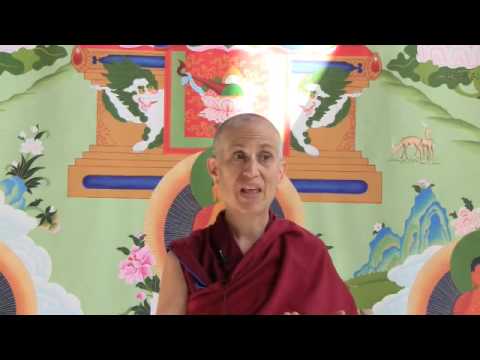Physical and verbal pathways of virtue
Stages of the Path #73: Karma, Part 10
Part of a series of Bodhisattva's Breakfast Corner talks on the Stages of the Path (or lamrim) as described in the Guru Puja text by Panchen Lama I Lobsang Chokyi Gyaltsen.
- Avoiding the nonvirtues of body and speech
- Acting in the opposite way from the nonvirtues of body speech
We’ve been talking about the 10 virtuous actions. One way to do them is just by avoiding the 10 nonvirtues when you have the opportunity. A second way is by taking and keeping the precepts not to do those. And then a third way is to do the exact opposite.
Instead of killing, trying to protect life. For example, we were talking the other day about covering outdoor containers full of water so the bugs won’t drown in them. Leaving sticks in a pail so if a mouse drowns he has a way to crawl out. Saving human beings lives in any way we possibly can. Protecting life, in general. And respecting life.
That could also include if somebody is suicidal, talking to them and helping them. Or if somebody is contemplating euthanasia, or contemplating assisting somebody in euthanizing themselves, to talk to that person about the consequences and the results of it. And to also show them that human life is valuable and meaningful even if the body does not function very well. That the human mind still has a lot of potential and can do very wonderful things.
Rather than stealing, to practice generosity, and to protect others’ property. Being respectful of others’ property. If people ask us to look over their things while they’re away, to do that. To practice being generous with what we have in giving it to others.
Instead of unwise and unkind sexual behavior, using sexual behavior wisely and kindly, with respect.
With speech, instead of lying, being truthful. But also being tactful when we’re truthful. In other words, not taking the precept about not lying as a means to rationalize saying all sorts of unkind things to somebody. You know what I mean? It’s like, “Well I have to tell them the truth so I’m going to say blah blah blah, ” and we know that it’s really going to hurt their feelings. I’m not talking about avoiding lying in that way. But respecting other human beings and telling them the truth, and trusting them enough to know that when we explain, hopefully they will forgive us if we’ve made a mistake. Most important thing, of course, is that we forgive ourselves. Bur really seeing the value in truth, and keeping to that.
The opposite of using our words to create disharmony is using our words to create harmony. If people are quarreling, if they aren’t getting along, then talking to them and helping them to heal the quarrel. Helping them to come back together again. You don’t want to get people back together again who are in a really dreadful relationship where one person is definitely being harmed. But when it’s just a regular kind of quarrel, to help people come together and be harmonious. Not only in individual relationships, but amongst groups of people, amongst countries, amongst nations. Any way that we can use our speech to promote harmony is quite beautiful. This can sometimes involve counseling people. Or sometimes just listening, being a good listener, and letting somebody say what they need to say and reflecting it back to them, often that’s enough to calm them down, and then they automatically heal their own relationships with others.
We’ll continue tomorrow.
Venerable Thubten Chodron
Venerable Chodron emphasizes the practical application of Buddha’s teachings in our daily lives and is especially skilled at explaining them in ways easily understood and practiced by Westerners. She is well known for her warm, humorous, and lucid teachings. She was ordained as a Buddhist nun in 1977 by Kyabje Ling Rinpoche in Dharamsala, India, and in 1986 she received bhikshuni (full) ordination in Taiwan. Read her full bio.


